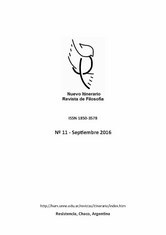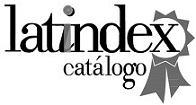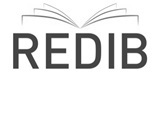Lecturas feministas de Julia Kristeva: sobre las formas de la lucha política y el problema que se niega a desaparecer
DOI:
https://doi.org/10.30972/nvt.1916574Resumen
En este artículo se recuperan las críticas que se le han hecho a Julia Kristeva desde ciertos feminismos, especialmente a partir del trabajo de Judith Butler y secundariamente de Nancy Fraser. Para esto, se reponen algunos conceptos claves del pensamiento de Kristeva, a la luz de una serie de discusiones al interior de la teoría feminista. En primer lugar, es posible ubicarlas en un contexto más general de reflexiones al interior del feminismo en la contienda entre el feminismo de la diferencia y el feminismo deconstructivista. Por otra parte, aunque vinculado a este primer punto, se inscribe en un debate más general de los feminismos con el psicoanálisis y de este último en su vínculo con cierto pensamiento postestructuralista. Nos interesa iluminar, a la luz de las críticas de Butler a esta, en qué términos, conceptos y discusiones del feminismo se inscribe este intercambio. Por último, el recorrido indicado permitirá distinguir qué formas adquiere la lucha política tanto en Julia Kristeva como Judith Butler.
Citas
Asenjo Postigo, M. (2020). ¿A los márgenes? La teoría feminista en la teoría moral y política. Las Torres de Lucca Vol. 9 (17), 81-100.
Beardsworth, S. (2004). Julia Kristeva. Pshychoanalysis and modernity. United States of America: State University of New York Press.
Benhabib, S. y Cornella D. (1990). Teoría feminista y teoría crítica. España: Edicions Alfons el Magnánim.
Butler, J. (2017). El género en disputa. El feminismo y la subversión de la identidad. Buenos aires: Paidós
Butler, J. (2018). Cuerpos que importan. El límite discursivo del sexo. Buenos Aires: Paidos.
Butler, J. (1989). The Body Politics of Julia Kristeva. Hypatia 3 (3), 104-118.
Castells, C. (1996). Perspectivas feministas en teoría política. Barcelona: Paidós.
Dietz, M. (1994). Ciudadanía con cara feminista: El problema con el pensamiento maternal. Debate Feminista 5 (10), 45-65.
Dietz, M. (2005). Las discusiones actuales de la teoría feminista. Debate Feminista (35), 179-224. Recuperado de: http://www.debatefeminista.cieg.unam.mx/wp-content/uploads/2016/03/articulos/032_11.pdf
Ducrot, O. y Todorov, T. (1972). Diccionario enciclopédico de las ciencias del lenguaje. Buenos Aires: Siglo veintiuno editores.
Elshtain, J. B. (1981). Public Man, Private Woman: Women in Social and Political thought. Princeton: Princeton University Press.
Fraser, N. (2015). Los usos y abusos de las teorías francesas del discurso para la política feminista (Trad. Martina Lassalle). Diferencia(s) 1 (1), 179–199.
Gilligan, C. (1977). In a Different Voice: Women’s Conceptions of Self and of Morality. Harvard Educational Review, 47(4), 481-517. Recuperado de https://doi.org/10.17763/haer.47.4.g6167429416hg5l0
González, A. C. (2014). Cuerpo y performatividad: una revisión crítica desde la perspectiva del psicoanálisis. Daimon(63), 131–146.
Kristeva, J. (2013). El genio femenino. La vida, la locura, las palabras. Tomo II. La locura. Melanie Klein o el matricidio como dolor y creatividad. Buenos Aires: Paidós.
Kristeva, J. (2001). La revuelta íntima. Literatura y psicoanálisis. Ciudad de Buenos Aires: Eudeba.
Kristeva, J. (2000). Poderes de la Perversión. México: Siglo Veintiuno editores
Kristeva, J. (1980). Desire in Language. New York: Columbia University Press.
Kristeva, J. (1981a). El Sujeto en Cuestión: el Lenguaje Poético en Levi-Strauss, C. et al. La identidad (pp. 249 – 287). Barcelona: Petrel
Kristeva, J. (1981b). Women’s Time (Trad. Jardine A., Blake, H.). Signs (1), 13-35.
Kristeva, J. (1988). El lenguaje, ese desconocido. Introducción a la lingüística. Madrid: Fundamentos.
Kristeva, J. (1985). Stabat Mater. Poetic Today 6 (1/2), 133 – 152.
Kristeva, J. (1998). Sentido y sinsentido de la revuelta: literatura y psicoanálisis. Buenos Aires: Eudeba
Kristeva, J. (1984). Revolution in Poetic Language. Nueva York: Columbia University Press.
Losiggio, D. y Zaidan, L. (2020). “Deconstrucción” en Nosetto, L. y Wieczorek, T. (comp.) Métodos de teoría política: un manual (pp. 123 – 144). Buenos Aires: Instituto de Investigaciones Gino Germani/ CLACSO.
Martínez, A. (2019) “La terceridad semiótica: Una crítica feminista de la Ley Simbólica del Padre en Psicoanálisis”, Aquila, 9(21), 55 – 96. En Memoria Académica. Disponible en: http://www.memoria.fahce.unlp.edu.ar/art_revistas/pr.10565/pr.10565.pdf
Pateman, C. (2018). El desorden de las mujeres. Argentina: Prometeo.
Peller, M. (2011). Judith Butler y Ernesto Laclau: debates sobre la subjetividad, el psicoanálisis y la política. Sexualidad, salud y sociedad (7), 44 – 68.
Rabinovich, D. (1995) Lo imaginario, lo simbólico y lo real. Clase Dra. Diana S. Rabinovich.
Sabsay, L. (2009). El sujeto de la performatividad: narrativas, cuerpos y políticas en los límites del género. [Tesis doctoral] Departament Institut Universitari d’estudis de la dona. Universitat de Valencia. Servei de Publicacions.
Schippers, B. (2010). Kristeva’s Time?. Feminist theory 11 (1), 85 – 94.
Suniga, N. y Luzza Rodríguez, P. G. (2014). Judith Butler, lectora crítica de Jacques Lacan, VII Jornadas de Sociología de la UNLP, 1–10. Disponible: http://www.memoria.fahce.unlp.edu.ar/trab_eventos/ev.4646/ev.4646.pdf
Suniga, N. y Tonkonoff S. (2012). Lenguaje, deseo y sociedad: los aportes de Julia Kristeva. VII Jornadas de Sociología de la UNLP, 5 al 7 de diciembre de 2012, 1–10. En Memoria Académica. Disponible en: http://www.memoria.fahce.unlp.edu.ar/trab_eventos/ev.2285/ev.2285.pdf
Young, I. (1996). Vida política y diferencia de grupo: Una crítica del ideal de ciudadanía universal. En Castells, C. Perspectivas feministas en teoría política. (pp. 99 - 126). Barcelona: Paidós ibérica.
Descargas
Publicado
Cómo citar
Número
Sección
Licencia
Les autores ceden a Nuevo Itinerario los derechos de publicidad de sus trabajos, toda vez que hayan sido admitidos como parte de alguno de sus números. Ello no obstante, les autores retienen los derechos de propiedad intelectual y responsabilidad ética así como la posibilidad de dar difusión propia por los medios que consideren.












51.jpg)

